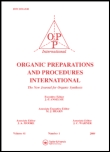
ORGANIC PREPARATIONS AND PROCEDURES INTERNATIONAL
Scope & Guideline
Catalyzing Discoveries in Organic Chemistry Since 1971
Introduction
Aims and Scopes
- Innovative Synthesis Methodologies:
The journal highlights new synthetic routes and methodologies for organic compounds, emphasizing practical, efficient, and reproducible procedures. - Green Chemistry Practices:
A strong focus is placed on environmentally friendly synthetic approaches, including the use of renewable resources, solvent-free reactions, and recyclable catalysts. - Catalysis in Organic Synthesis:
Research articles often explore the development and application of novel catalysts, including nanocatalysts and organocatalysts, to improve reaction efficiency and selectivity. - Biological Activity and Applications:
Many publications assess the biological activities of synthesized compounds, linking synthetic chemistry with medicinal chemistry and drug development. - Multicomponent Reactions:
The journal encourages research on multicomponent reactions, which allow for the rapid construction of complex molecules in a single step.
Trending and Emerging
- Sustainable and Green Chemistry:
There is a significant increase in research focused on sustainable chemistry practices, including the use of biobased solvents, renewable resources, and methodologies that minimize environmental impact. - Nanocatalysis and Recyclable Catalysts:
The use of nanotechnology in catalysis is trending, with numerous studies highlighting the development of nanocatalysts that are efficient, selective, and easily recoverable for repeated use. - Microwave and Ultrasound-Assisted Synthesis:
Emerging techniques such as microwave and ultrasound-assisted synthesis are gaining popularity, offering faster reaction times and improved yields. - Biological Evaluation of Synthesized Compounds:
An increasing number of publications are integrating biological evaluations of synthesized compounds, showcasing their potential as pharmaceutical agents and expanding the interdisciplinary nature of research. - Multicomponent and One-Pot Reactions:
There is a growing interest in multicomponent and one-pot reactions, which streamline the synthesis process and reduce the need for extensive purification steps.
Declining or Waning
- Traditional Synthetic Methods:
There is a noticeable decline in the publication of papers focusing solely on traditional organic synthesis methods, as researchers increasingly seek innovative and efficient alternatives. - Non-Green Solvents and Reagents:
Research involving conventional solvents and reagents is becoming less common, as the focus shifts towards greener, more sustainable practices. - Single-Component Synthesis:
The emphasis on single-component synthesis techniques has decreased, with a growing preference for more complex, multicomponent approaches that offer greater synthetic efficiency. - Inorganic Catalysis:
While studies on inorganic catalysts remain relevant, there is a diminishing trend in papers focusing exclusively on these catalysts, as organic and biodegradable alternatives gain traction.
Similar Journals

ORGANIC SYNTHESES
Elevating Standards in Organic Synthesis ResearchORGANIC SYNTHESES is a prestigious journal dedicated to the field of organic chemistry, published by ORGANIC SYNTHESES INC. Since its inception in 1946, the journal has served as a vital platform for researchers, educators, and practitioners in chemistry, showcasing significant findings and methodologies that advance the discipline. Although it currently does not offer open access, it is recognized for its rigorous peer-review process and its contribution to standardizing organic synthesis methods. With an ISSN of 0078-6209 and an E-ISSN of 2333-3553, the journal's impact reflects its quality, with a current Scopus ranking placing it in the fourth quartile in both Organic Chemistry and Physical and Theoretical Chemistry. This positioning underscores its critical role in fostering knowledge and innovation within these fields. Researchers and students alike will find ORGANIC SYNTHESES an essential resource for staying informed on contemporary practices and discoveries in organic synthesis.
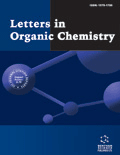
LETTERS IN ORGANIC CHEMISTRY
Advancing the Frontiers of Organic ChemistryLETTERS IN ORGANIC CHEMISTRY is a distinguished journal published by Bentham Science Publishers Ltd, focusing on the rapidly evolving field of organic chemistry. Established in 2005, the journal commits itself to disseminating vital research findings, reviews, and innovative methodologies that contribute to the understanding and advancement of organic chemistry and biochemistry. With an ISSN of 1570-1786 and an E-ISSN of 1875-6255, this journal enhances accessibility and visibility for authors and readers alike, albeit not adopting an open-access model. Positioned within Q4 quartile rankings for both Biochemistry and Organic Chemistry, it serves a niche audience keen on exploring emerging trends and breakthroughs in these disciplines. Its Scopus rankings further reflect its role in the global academic landscape, albeit at the beginning stages of its impact journey. Based in the United Arab Emirates, LETTERS IN ORGANIC CHEMISTRY is dedicated to fostering dialogue among researchers and practitioners, paving the way for future innovations in organic and biochemical sciences.
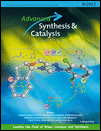
ADVANCED SYNTHESIS & CATALYSIS
Fueling innovation in chemical research.ADVANCED SYNTHESIS & CATALYSIS is a prestigious academic journal published by Wiley-VCH Verlag GmbH, based in Germany. This journal, with ISSN 1615-4150 and E-ISSN 1615-4169, plays a pivotal role in the fields of Chemistry and Chemical Engineering, earning commendable rankings such as Q2 in Catalysis and Q1 in Organic Chemistry in 2023. Its high impact factor and recognition—ranking #18 in both Organic Chemistry and Catalysis—further underscore its significance as a platform for groundbreaking research and innovative methodologies. Spanning from 1996 through 2024, ADVANCED SYNTHESIS & CATALYSIS aims to disseminate high-quality, cutting-edge studies related to synthetic processes and catalytic technologies, ensuring accessibility via their open access options. By fostering a vibrant scholarly community, this journal serves as an essential resource for researchers, professionals, and students dedicated to driving advancements in synthetic and catalytic chemistry.

Mini-Reviews in Organic Chemistry
Bridging Research and Application in Organic Science.Mini-Reviews in Organic Chemistry, published by Bentham Science Publishers, is an esteemed journal in the field of organic chemistry, dedicated to presenting concise, thoughtful reviews that encapsulate the rapid advancements in this dynamic area of study. Since its inception in 2005, the journal has become a valuable resource for researchers, professionals, and students interested in the latest developments and trends, featuring an HIndex indicative of its scholarly impact. With its 2023 Scopus ranking placing it in the 52nd percentile and categorized as Q3 in Organic Chemistry, it offers insights that bridge the gap between fundamental research and practical applications. While not an open-access journal, it provides significant access options for institutional journals and library systems. Situated in the United Arab Emirates, Mini-Reviews in Organic Chemistry continues to serve as a beacon for innovation and knowledge dissemination in organic chemistry, ensuring that its audience remains at the forefront of scientific discovery.
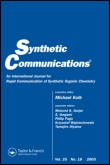
SYNTHETIC COMMUNICATIONS
Catalyzing Collaboration in Organic Chemistry ResearchSynthetic Communications, published by Taylor & Francis Inc, stands as a pivotal resource in the field of organic chemistry since its inception in 1971. With an ISSN of 0039-7911 and an E-ISSN of 1532-2432, this journal has established a commendable reputation, holding a Q3 ranking in organic chemistry by 2023, reflecting its contributions to the discipline and positioning it within the 50th percentile according to Scopus rankings. Targeted towards researchers, professionals, and students alike, Synthetic Communications aims to disseminate significant advancements in synthetic methodologies and reactions, facilitating the exchange of innovative ideas and enhancing collaborative efforts in the scientific community. Although not an open-access journal, it offers a wealth of valuable research content that is crucial for anyone dedicated to pushing the boundaries of organic chemistry.

ALDRICHIMICA ACTA
Connecting Researchers with Cutting-Edge DiscoveriesALDRICHIMICA ACTA is a prestigious journal published by Aldrich Chemical Co Inc, focusing on the dynamic field of organic chemistry. With an impressive H-index and a strong Scopus rank of #38 out of 211 journals, this quarterly publication has established itself in the Q1 quartile of organic chemistry, a testament to its influence and relevance in research. The journal, which has been in circulation since 1990, disseminates high-quality research articles, reviews, and practical insights tailored for chemists, researchers, and industry professionals. While the journal operates under a subscription model, it remains a crucial resource for staying updated with the latest advancements and methodologies in organic chemistry. Located in Milwaukee, Wisconsin, ALDRICHIMICA ACTA continues to contribute significantly to the field, promoting excellence in scientific communication and collaboration.
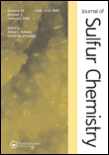
Journal of Sulfur Chemistry
Pioneering Discoveries in Sulfur ChemistryThe Journal of Sulfur Chemistry, published by Taylor & Francis Ltd, is a pivotal resource dedicated to the field of sulfur chemistry, offering a unique platform for researchers, professionals, and students alike to explore innovative discoveries and advancements. With an ISSN of 1741-5993 and an E-ISSN of 1741-6000, this journal has been a prominent contributor to the academic discourse since its inception in 2004, converging knowledge and research through the year 2024. Recognized in the 2023 Scopus rankings, it holds a strong position at Q3 in the category of miscellaneous chemistry, ranking #173 out of 408, within the 57th percentile, underscoring its role as a valuable asset in the chemistry community. Although the journal does not currently offer open access, it remains a vital source for novel insights and scholarly articles, significantly impacting ongoing research and education in sulfur chemistry.
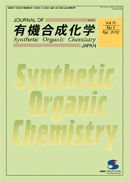
JOURNAL OF SYNTHETIC ORGANIC CHEMISTRY JAPAN
Unveiling the complexities of synthetic organic processes.JOURNAL OF SYNTHETIC ORGANIC CHEMISTRY JAPAN, published by the SOCIETY OF SYNTHETIC ORGANIC CHEMISTRY, JAPAN, is an esteemed publication specializing in the dynamic field of organic chemistry. With a rich history dating back to 1944, this journal aims to disseminate pivotal research findings and innovative methodologies in synthetic organic chemistry, fostering collaboration and knowledge exchange among researchers and professionals. Although it currently holds a modest ranking in the Q4 quartile for organic chemistry, its commitment to advancing the discipline remains steadfast. The journal primarily caters to scholars and students seeking to delve deeper into organic synthesis, highlighting original articles, reviews, and methodological studies. While access to the journal is not open, its contributions to the field are essential for anyone invested in understanding the complexities of organic chemistry. We invite you to explore the journal's offerings and enhance your expertise in synthetic organic processes.

RUSSIAN JOURNAL OF ORGANIC CHEMISTRY
Illuminating the Path of Organic Chemistry ResearchRUSSIAN JOURNAL OF ORGANIC CHEMISTRY, published by MAIK NAUKA/INTERPERIODICA/SPRINGER, stands as a pivotal resource in the realm of organic chemistry, catering to an audience of researchers, professionals, and students keen on the latest advancements in this dynamic field. With an ISSN of 1070-4280 and E-ISSN of 1608-3393, this journal has been a fixture in academic literature since its inception in 1996 and continues to play a significant role as it converges towards 2024. Despite currently holding a Q4 ranking in organic chemistry and a modest placement in the Scopus ranks, the journal offers valuable insights and contributions that reflect the ongoing research and trends within the discipline. Though it does not operate under an open access model, the journal provides essential studies and reviews that enhance scientific dialogue and innovation. Located in the United States, the journal supports the advancement of organic chemistry, fostering a deeper understanding of complex chemical interactions and methodologies.

JOURNAL OF HETEROCYCLIC CHEMISTRY
Illuminating the Path of Heterocyclic DiscoveriesJournal of Heterocyclic Chemistry, published by Wiley, stands as a key resource in the field of organic chemistry, offering in-depth research articles and insights spanning from 1966 to 2024. With its strong Scopus ranking of #83 out of 211 in the Organic Chemistry category, placing it in the 60th percentile, the journal maintains its significance and relevance within the academic community. Although it does not currently offer open access options, it provides extensive coverage of heterocyclic compounds, which are vital to various applications in pharmaceuticals and material sciences. The journal's commitment to high-quality research is further reflected in its classification as Q3 in the 2023 quartiles for Organic Chemistry. Researchers, professionals, and students alike will find valuable contributions to the intricate studies of heterocycles, enhancing their understanding and exploration of this fascinating area of chemistry.